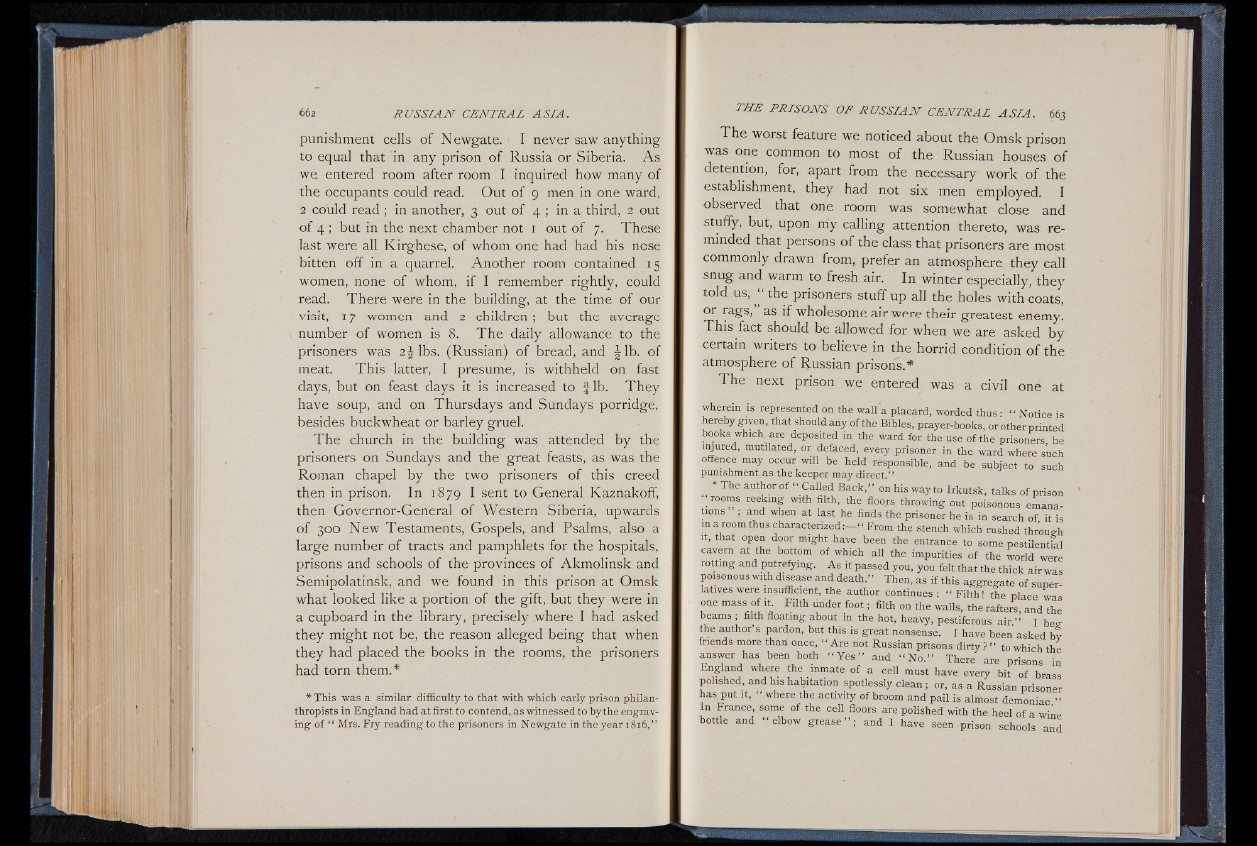
punishment cells of Newgate. ; I never saw anything
to equal that in any prison of Russia or Siberia. As
we entered room after room I inquired how many of
the occupants could read. Out of 9 men in one ward,
2 could read; in another, 3 out of 4 ; in a third, 2 out
o f 4 ; but in the next chamber not 1 out of 7. These
last were all Kirghese, of whom one had had his nose
bitten off in a quarrel. Another room contained 15
women, none of whom, if I remember rightly, could
read. There were in the building, at the time of our
visit, 17 women and 2 children ; but the average
number of women is 8. The daily allowance to the
prisoners was 2Jibs. (Russian) of bread, and Jib. of
meat. This latter, I presume, is withheld on fast
days, but on feast days it is increased to fib . They
have soup, and on Thursdays and Sundays porridge,
besides buckwheat or barley gruel.
The church in the building was attended by the
prisoners on Sundays and the' great feasts, as was the
Roman chapel by the two prisoners of this creed
then in prison. In 1879 I sent to General Kaznakoff,
then Governor-General of Western Siberia, upwards
of 300 New Testaments, Gospels, and Psalms, also a
large number of tracts and pamphlets for the hospitals,
prisons and schools of the provinces of Akmolinsk and
Semipolatinsk, and we found in this prison at Omsk
what looked like a portion of the gift, but they were in
a cupboard in the library, precisely where I had asked
they might not be, the reason alleged being that when
they had placed the books in the rooms, the prisoners
had torn them.*
*T h is was a similar difficulty to that with which early prison philanthropists
in England had at first to contend, as witnessed to by the engraving
of “ Mrs. Fry reading to the prisoners in Newgate in the year 1816,”
The worst feature we noticed about the Omsk prison
was one common to most of the Russian houses of
detention, for, apart from the necessary work of the
establishment, they had not six men employed. I
observed that one room was somewhat close and
stuffy, but, upon my calling attention thereto, was reminded
that persons of the class that prisoners are most
commonly drawn from, prefer an atmosphere they call
snug and warm to fresh air. In winter especially, they
told us, “ the prisoners stuff up all the holes with coats,
or rags,” as if wholesome air were their greatest enemy.
This fact should be allowed for when we are asked by
certain writers to believe in the horrid condition of the
atmosphere of Russian prisons.*
The next prison we entered was a civil one at
wherein is represented on the wall a placard, worded th u s : “ Notice is
hereby given, that should any o f the Bibles, prayer-books, or other printed
books which are deposited in the ward for the use of the prisoners be
injured, mutilated, or defaced, every prisoner in the ward where such
offence may occur will be held responsible, and be subject to' such
punishment as the keeper may direct.”
* The author of “ Called B a ck ,” on his way to Irkutsk, talks of prison
rooms reeking with filth, the floors throwing out poisonous emanations
, and when at last he finds the prisoner he is in search of it is
in a room thus characterized:— “ From the stench which rushed through
it, that open door might have been the entrance to some pestilential
cavern at the bottom of which all the impurities of the world were
rotting and putrefying. A s it passed you, you felt that the thick air was
poisonous with disease and death.” Then, as if this a ggregate of superlatives
were insufficient, the author continues : “ Filth' the place was
one mass of it. Filth under fo o t; filth on the walls, the rafters and the
beams ; filth floating about in the hot, heavy, pestiferous air.” I beg
the author’s pardon, but this is great nonsense. I have been asked bv
friends more than once, “ A re not Russian prisons dirty ? ” to which the
answer has been both “ Y d s ” and “ N o .” There are prisons in
England where the inmate of a cell must have every bit of brass
polished, and his habitation spotlessly clean ; or, as a Russian prisoner
has put it, “ where the activity of broom and pail is almost demoniac ”
In France, some of the cell floors are polished with the heel of a wine
bottle and “ elbow g r e a s e ” ; and I have seen prison schools and